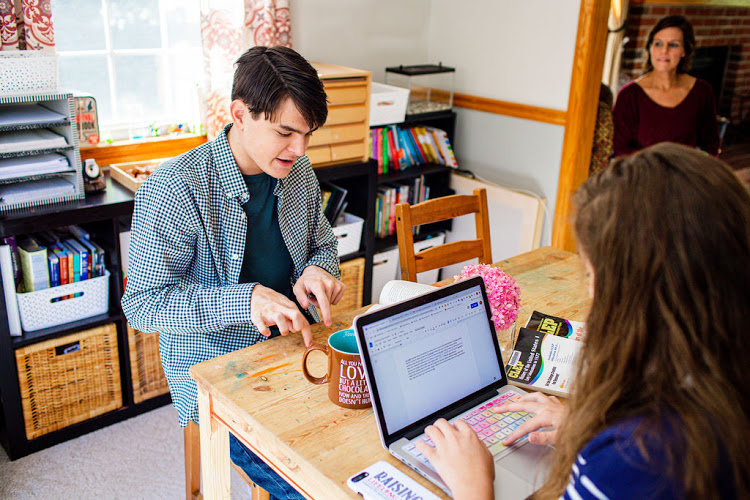Homeschooling a Profoundly Gifted Child
I never planned to homeschool. If you’d asked me 15 years ago if I’d even consider it, I would have told you that, not only wouldn’t I have, but that homeschoolers were strange and that schools were perfectly equipped to handle all that came their way. That kids needed to be with same age peers. Even a profoundly gifted child.
And then my first born went to school.
You see, Trevor was a curious kiddo from the get-go. Never slept as a baby, watched everything, was verbal from early on and got into everything. He asked big questions, had big worries, and thought big thoughts. His preschool and daycare teachers called him “an extreme thinker.” I thought he’d adore school.
And he did — at first.
It all started changing in first grade. Little things. Then bigger things. Until one day it became clear to us that the public school in our area just wasn’t going to work for our son.
Why Homeschool a Profoundly Gifted Child
Trevor is a profoundly gifted child, and with that giftedness comes a slew of other issues — anxiety, overexcitability, sensory challenges., among others. Gifted kids — particularly profoundly gifted children — are not the stereotypical answer-givers most people think of when they think of giftedness.
The longer I homeschool my gifted children, and the more I see and talk to other parents of gifted and twice-exceptional kids, the more I believe that homeschooling is the best educational option for our nation’s above-average children.
Homeschooling is “best-practice education” for gifted kids. Throughout my coursework in gifted studies, I came to the conclusion that the basic underlying tenet of gifted education – meet children where they are, wherever that is, and move them forward towards their potential – is best-practice for ALL children.
Do You Have a Profoundly Gifted Child?
Gifted kids tend to:
- learn basic skills quickly and with little practice.
- construct and handle abstractions easily.
- pick up nonverbal cues and draw inferences that are tough for children their age to see.
- take little for granted, preferring to know the ‘”hows” and “whys.”
- be wildly eclectic and intensely focused on their interests.
- have boundless energy {causing many to be misdiagnosed as ADHD}.
- relate well to adults, preferring to spend their time conversing with older children and grownups.
- be highly inquisitive.
- be interested in the unusual.
- want to explore their world persistently.
- observe deeply.
- be single-minded.
- ask “what if” all.the.time.
- to learn faster & with greater depth than same-aged peers.
Any of these characteristics in isolation is tough to address in a typical classroom, a kid with many of them is completely lost in the masses. There is simply no way one teacher can meet these needs while remediating for those who struggle, and teaching the typical students well. And my son’s needs were not being met.
Too often, gifted students get pushed aside because they “already know the material” and “will be just fine.”
But they won’t be fine.
How to Homeschool a Profoundly Gifted Child
All children have the right to be met where they are intellectually, and given the tools and teaching they need to work towards their potential.
At home, you are able to talk to your son about what he wants to learn. Self-directed, interest-based, engaged learning is the best kind of learning for a gifted child.
You can choose to skip whole chapters in the math series if you see that your daughter has already mastered those concepts — in fact, I encourage you to do so.
If your child struggles with his thoughts coming faster than he can physically write, you can be his scribe for a while. Or you can hand over your old netbook or laptop. You can even do what we do with our teen and remove the hand from handwriting altogether when it comes to essays and stories, and purchase a program like Dragon dictation and let him dictate his work, going back over it later to edit and revise the work.
You can easily incorporate movement into the day for your child who seems like he is in constant motion. We’ve had a mini-trampoline inside the house since we began homeschooling, and my overexcitable kiddos can take any breaks they need in order to be completely successful.
Lessons can be chopped to the five or ten most difficult problems. If those are answered correctly, why bother having your daughter do the rest of them? She clearly knows the material.
Is your child intensely interested in astronomy? You can see that he visits the local science center, writes to an astronomy professor at a local university, joins a junior astronomical society, finds books in the library that match both his interest-level and reading ability, and that he pulls all his knowledge together to share it with someone and solidify his learning.
During his first half-year of homeschooling, right after we pulled him out of first-grade mid-year, Trevor did just that. He immersed himself (as a 7-year-old) in the world of advanced astronomy. While he couldn’t read all of the books we found at his intellectual and interest level, I was able to incorporate them as read alouds. He pulled everything together into a lapbook so thick it has to be rubber banded closed, and shared it with anyone who stopped by ) for a r-e-a-l-l-y long time).
But he KNOWS about advanced astronomy still. He asks great questions when he visits the science center and someone from the NASA-Glenn Space Center is visiting. By tapping into his interests, and running with them, we were able to cover science, reading, writing, and history in a way that was motivating and engaging for him.
Homeschooling works for gifted kids because their needs can be met in ways that are as unique as they are. It allows us to raise them to be lifelong learners — fully in charge of their own learning potential.
The hardest part of homeschooling your gifted kids, for you, will be getting out of the way. I don’t mean leaving them to their own designs, though many would argue that unschooling is a good option for gifted kids – I’m too, well, controlling to give up the reigns completely, and I know my kids’ personalities. They don’t do very well when things get too unstructured.
Resources For Homeschooling A Profoundly Gifted Child
One thing that has helped me has been thinking of simple ways to adjust my curriculum when it comes to gifted learners.
By getting out of the way, I mean not getting tied to one thing. Be flexible and ready to embrace new topics and methods. It might be pirates one month, and astronauts another, with butterflies and lifecycles thrown in there for a week when your child has stumbled across a cool fact and wants to explore, but learning will take place.
When you make the leap to homeschool your profoundly gifted child, worlds of possibilities open up. The hardest part for me was shifting paradigms and embracing a homeschooling lifestyle fully.
It’s so worth it.
And Trevor? That “extreme thinker?”
I just graduated him from our homeschool. Eleven years and countless challenges and adventures, and he’s thriving. He’s running his own business, one he founded when he was fourteen, and plans to live at home, take classes, and grow that business before heading out on his own.
I’m so grateful we took the chance on homeschooling all those years ago.




